#hws Ethiopia
Explore tagged Tumblr posts
Text

Haven't posted art in a hot moment so i'm dropping this piece i did of f! ethiopia x m! yemen for a friend YIPPPEEE
#hetalia#hetalia ocs#aph yemen#aph ethiopia#hws yemen#hws ethiopia#yemethio#historically inaccurate hair is historically inaccurate#aph nyo ethiopia#hws nyo ethiopia#nyo ethiopia
153 notes
·
View notes
Text

I forgot about this Ethiopia design that i tucked into my sketchbook and never exposed to the light of day lol oops....
#i kinda based it off ethiopia's manner of speaking in the gakuen hetalia demo#hetalia#aph#hws#aph ethiopia#hws ethiopia#hetalia oc
28 notes
·
View notes
Text


[REPOST FROM OLD ACC]
still my favorite tbh
original
#hws russia#hws china#hws india#hws iran#hetalia#hws persia#aph russia#aph china#aph india#aph iran#aph persia#hws argentina#hws brazil#hws saudi arabia#hws south africa#hws ethiopia#aph argentina#aph brazil#aph saudi arabia#aph south africa#aph ethiopia#nyo china#aph
41 notes
·
View notes
Text

more Tigist!
I really thought of keeping her a private oc but how can I keep this beauty to myself??
#hetalia#hws#aph#hetalia ethiopia#aph ethiopia#hws ethiopia#country personification#my art#look at her just look at herrr#hetalia oc
22 notes
·
View notes
Text
China: I'm the oldest aru
Ethiopia: I'm older than you lol
China: Then I'm the oldest in Asia!
Yukaghir: Allow me to present myself....
#hetalia#cultural hetalia#historical hetalia#hetalia ethiopia#hws ethiopia#aph ethioptia#hetalia yukaghir#hetalia siberia#aph siberia#hws siberia#aph yukaghir
5 notes
·
View notes
Text

Hiii this is my super very vrry cool au!!
Hetali:ethiopical toilets :3🇪🇹!!!
#hetalia#hetalia fanart#hetalia axis powers#hetalia fandom#hetalia world stars#aph italy#hws italy#aph japan#hws japan#hetalia au#ethiopia#art#artists on tumblr
21 notes
·
View notes
Text
Brand new 2 floor house one bedroom and two bedrooms second floor house with a low budget vintage apartment upstairs 1bed ans 2 bed available full pop design for bedrooms located at phycratic rumuola area in port Harcourt city rivers state Nigeria.
#lagos#abuja#vietnam#wike#bangladesh#rivers state#nysc#nigeria#youtube#portharcourt#china#chinatown#hws china#aph china#sri lanka#east asia#europe#ethiopia#cup of china 2024
1 note
·
View note
Text





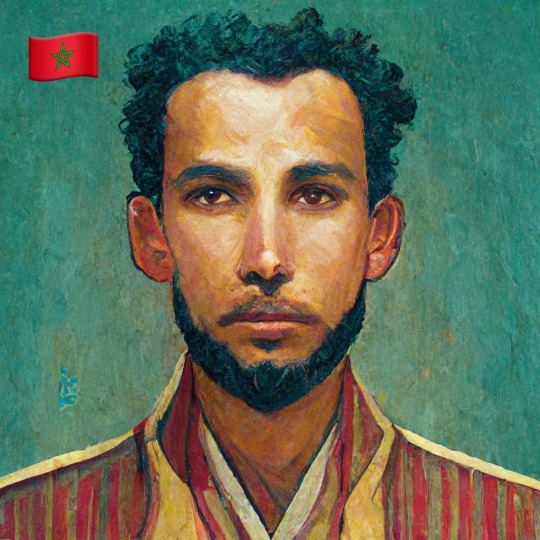




Part 3! As always, alphabetical order.
I sent an AI generator the prompt “if [country name] were a person painted in the style of [painter(s) from that country]”
@jinsai-ish recommended Japan and Korea (I’ve only included S. Korea in this batch!), @pizzaapplecheese recommended Jordan and UAE, and @shu-dzhoker recommended Colombia. Thanks all for your feedback!
EDIT: After some discussion with a fellow fan, it’s been brought to my attention that I failed to recognize the fact that several of the portraits I’ve featured (particularly those of East Asian Women) can be hurtful due to their whitewashed features, and could reinforce whitewashed stereotypes with other viewers who are unaware of the issue.
This series started as an experiment to learn how the AI works, and over time I have become very aware that this AI has had very whitewashed “training” for its algorithm, particularly for portraits. However, in my excitement over the possibilities for future prompts, I failed to register those problems and additionally failed to consider the negative impact of sharing the portraits publicly, especially with no acknowledgement of the AI’s biases. I apologize to anyone who was hurt by any of these images, and would encourage everyone to learn more about the embedded biases of AI generators by reading articles like this one from Vice or this one from Science.
#hws argentina#hws Colombia#hws Ethiopia#hws Japan#hws Jordan#hws Morocco#hws south korea#hws sweden#hws switzerland#hws United Arab Emirates
36 notes
·
View notes
Text
I've had to explain he wasn't a monster, I was lucky compared to a lot of women, he didn't abuse me, he didn't cheat I just wasn't happy. For a long time I didn't think just being unhappy was a " reason to leave". I called his brother because I needed him to be someone else's responsibility so that I wouldn't cave (as I had done before) and I could just move on knowing that he was at least with his family.. Cuma masalahnya the current movement yang terjadi itu si cowonya gajinya pas pasan tapi pingin cewenya banyak dan cewenya banyak yang cuma jadi HW tanpa stable finance. Also when older men recruit younger girls (read: kids) to become their wives. That a big yikes man. Other than the face, our hair is also important. If we do not take care of this, it will become very obvious to others that we are unattractive. So, take care of the hair. Ethiopia in particular sought to "Amhara ify" the region and spread Christianity in the region. The Habeshas/Ethiopians had conquered and subjugated many peoples and took their lands. Somalis were the only people in the region they could not enforce their culture and religion on nor conquer them. By the time you go to bed you are typically carrying way more water than normal all the water you had in your body originally before the meal, plus everything you drank and several liters of it are literally sitting in your gut, making the food nice liquid so it can be digested. The water stays there for about 10 12 hours. (well, some stays for several days actually, but a large proportion of it is reabsorbed in the small intestine by approx 12 hrs). It an ethnoreligious group. One can convert and become a jew, and pass on that jewishness to even atheist children, who will be regarded as ethnically jewish if they came from a jewish mother (jewish culture traces lineage matrilineally). It both a ethnicity and a religion at the same time. I so sorry. This isn what I expected to see at all when I started reading thru this thread. The 11th was 18 months since my brother died at 32. But Batman 완주출장안마 can go the next step. He like Sherlock Holmes. He can look at a murder scene, see a spilled glass of wine, observe the powder burns on a body, notice a guy tan lines, smell whats in the air, he can pick out those details from among thousands of other irrelevant details at a crime scene and make logical deductions about what happened. I'd say my skin is quite resilient but VERY acne prone. I wouldn't worry about the sensitivity part as much, since Glossier 완주출장안마 is very well formulated, but because I struggle with breakouts I'm careful to only use a brush in the pot and always to wash it after use to prevent bacteria growth. Stretch concealer covers up scarring and breakouts quite well, and I find that it looks better and better throughout the day. This one has been mentioned on quite a lot of sites when you search for Japanese Beauty Must Haves. I believe this was 8 9 but it comes in a huge 500ml bottle and had 5 DIY sheet mask included. I use this as a toner. If we turn from the land to the sea, we shall find the latter as abundantly stocked with living creatures as the former is poorly so. In all parts of the world a rocky and partially protected shore perhaps supports, in a given space, a greater number of individual animals than any other station. There is one marine production which, from its importance, is worthy of a particular history.
1 note
·
View note
Text
In the Valley of Death: Somaliland’s Forgotten Genocide

Published: The Nation (22 October 2018) w/ Ismail Einashe
On a hot and humid June afternoon, a group of boys wearing FC Barcelona jerseys kicked around a soccer ball in the Malko-Durduro, a dry seasonal river on the outskirts of Hargeisa, the capital of the breakaway territory of Somaliland. At first glance, the flat, red earth of the riverbed made for a typical improvised pitch in this arid region. But recent heavy rains had exposed what had earned the area its moniker, the Valley of Death. Around them, human bones protruded from the ground. But these kids had grown up playing soccer surrounded by skeletal remains; they hardly noticed them.
Between 1987 and 1989, the regime of Somali dictator Siad Barre massacred an estimated 200,000 members of the Isaaq tribe, the largest clan group in the northwest part of Somalia. At the time, some Isaaqs were fighting for independence, and to eliminate the threat, Barre tried to exterminate all of them. Experts now say there are more than 200 mass graves in Somaliland, most of them in the Valley of Death.
This year marks the 30th anniversary of what is often called the “Hargeisa Holocaust,” when about 90 percent of the city was destroyed and tens of thousands of Isaaqs were killed. Yet there are no major plans to mark the horrors in Somaliland, or anywhere else for that matter. In the past, a few international organizations have recognized the bloodletting. A 2001 UN report investigating the attacks against the Isaaqs concluded, “the crime of genocide was conceived, planned and perpetrated by the Somalia Government against the Isaaq people of northern Somalia.” But the events have been mostly forgotten; the boys playing soccer did not know the story behind the bones.
Even in Hargeisa, many people don’t realize the extent of US support during the genocide. No American has ever apologized for what happened in Somaliland; there has been no internationally backed Truth and Reconciliation Commission; and no one has been criminally punished. There is little funding to investigate—let alone prosecute—the perpetrators. And some of the Somali genocidaires now have close ties to the US-backed government in Mogadishu of President Mohamed Abdullahi Mohamed, known as Farmajo.
COLD WAR PROXY
The country of Somalia was formed in 1960, when British Somaliland gained its independence from Britain and joined with its much larger neighbor to east and south, Italian Somaliland. Nine years later, General Siad Barre took over in a bloodless coup and steered the young country toward the Soviet Union. Somalia was strategically placed along Africa’s longest coastline, and the Soviets welcomed a new proxy in the Horn of Africa.
This all changed in 1977 when Barre invaded the Somali-majority Ogaden region of southeastern Ethiopia. Previously Ethiopia had been aligned with the US, but after the Derg military junta seized power in 1974, the Soviets had begun supporting Somalia’s communist neighbor. Forced to choose between allies, the Soviets sided with the Derg junta, and sent arms and military advisers . Cuba’s Fidel Castro provided an additional 13,000 troops, and Ethiopia repelled the Somali army in 1978.
Livid at the Soviet support for Ethiopia, Barre switched sides, allying himself with the US. In January 1981, former US secretary of state Henry Kissinger visited the presidential palace in Mogadishu, hoping to further strengthen US-Somalia ties. Barre had criticized President Jimmy Carter for not backing his country against the Soviets. But now Kissinger was convincing President Ronald Reagan to view Somalia as a crucial theater for US-Soviet confrontation. A year later, Barre made the trip to Washington, DC, to meet with Reagan in the Oval Office. Grainy footage of the encounter shows Barre asking Reagan for help. “Somalia is not afraid of any other country in the region, but it cannot cope with a superpower like the Soviet Union,” he told Reagan.
Barre said the United States agreed to help Somalia, because it “is also in its own interest.” In the 1983 budget, Reagan requested $91 million in military and economic assistance for Somalia, plus another $18 million in food aid for refugees. That year Somalia’s entire GDP was less than $750 million.
Around this time, Paul Manafort, a lobbyist who would become the chairman of Donald Trump’s 2016 presidential campaign, took on the Barre government as a client. In 1980 Manafort founded the lobbying company, Black, Manafort and Stone, which had close ties to the Reagan White House and later the George HW Bush administration. Riva Levinson, who worked with Manafort in the 1980s, has said she asked at the time, “Are we sure we want this guy as a client?” Manafort sounded agitated: “We all know Barre is a bad guy, Riva. We just have to make sure he’s our bad guy.”
Manafort did PR for Barre even as he was massacring the Isaaqs. Levinson said Manafort sent her to Somalia to have Barre sign a contract for $1 million. “Our assignment would then be to clean up Siad Barre’s international reputation, which needed plenty of soap,” she wrote in The Washington Post in 2017.
With Manafort’s PR work and the country’s anti-Soviet Union alignment, the US was happy to turn a blind eye to Barre’s abuses. By 1988, the US had given his government hundreds of millions dollars of military and economic aid, and Barre had become entirely dependent on US support.
THE GENOCIDE AND THE US
Barre had long targeted and discriminated against the Isaaq tribe, and so in 1981 in London, Isaaq dissidents formed the Somali National Movement (SNM) to overthrow Barre’s rule in the north of the country. Barre responded to this insurgency with a ruthless military campaign. In 1988, Amnesty International reported the Barre regime used ”widespread arbitrary arrests, ill treatment and summary executions” and torture of those suspected of collaborating with the SNM. They found that those who opposed the Barre regime were gathered, bound, and taken to places like the Valley of Death where they were shot and buried in unmarked graves.
One of the most brutal parts of the genocidal campaign was the destruction of Hargeisa, the largest city in northern Somalia. In May of 1988, Barre’s regime sent in fighter jets to level the city. The destruction of Hargeisa was so total that it earned the nickname “the Dresden of Africa.” Bombing missions and ground troops attacks killed more than 40,000 people. Burao, the third largest city in Somalia at the time and the second principal city in northern Somalia, was razed. The relentless violence against Isaaq civilians in 1988 resulted in the world’s largest refugee crisis. More than 300,000 refugees fled to Ethiopia, most of them arriving in the small border town of Harta Sheikh in Ethiopia, which became the largest refugee camp from 1988 until it closed in 2004.
Saad Ali Shire, Somaliland’s current foreign minister, told us, “In 1988, when the government started bombarding Hargeisa and other towns in Somaliland, the Americans were of course friends of the Siad Barre regime … for strategic reasons. … And they gave Siad Barre arms—arms were unloaded in Berbera port—and it was reported by Amnesty International and other human-rights organizations at the time.”
He paused and then said, “The US was not directly involved in the inhuman treatment of the people of Somaliland, but, like many other allies of the regime then, of course their hand was there.” The US mission to Somalia did not return a request for comment.
The US knew what was going on and maintained its support. A cable released by Wikleaks from that period and sent by the US embassy in Mogadishu noted: “Many displaced persons (i.e. Isaaqs) would have returned home long ago had they not been deterred from doing so by … government forces.” The cable continued: “Isaaqs, suffering from thirst, hunger, disease, and abominable camp conditions, were demanding to go home.” There was no discussion of cutting support for Barre as the genocide unfolded.
But as the US ramped up its bombing campaigns in Iraq and the Cold War ended, the US eventually decided to redirect its resources from Barre’s government to the Middle East. Without US support, the government of Somalia collapsed.
Around that time, on May 18, 1991, the SNM declared the northwest bit of Somalia independent and established the Somaliland Republic. The international community still does not recognize Somaliland as a sovereign country, but it has all the trappings of a nation-state—a Constitution, a president, a currency, and even biometric passports.
THE HUMAN CONSEQUENCES
Three tumultuous decades later, the genocide still haunts survivors. Somaliland has one main tribute to the victims: In the middle of a traffic island in Hargeisa, the rusting shell of a MiG fighter jet shot down by the SMN sits perched on top of a wall with murals of mass slaughter. The central figure in one painting is a man with blood spurting out of his limbs after his arms and legs have been chopped off.
For survivors like Yusuf Mire the trauma depicted on the murals is still fresh. During a crackdown in 1988 by Barre’s forces in the city of Burao, Somali troops hacked off his left arm, and abducted and killed his family.
Mire has dedicated his life to uncovering the truth of what happened in the Valley of Death. He works with survivors and families of the disappeared, helping those who, like him, had loved ones that never returned from Barre’s killing fields. Mire told us that the US is simply not interested in digging up the past or funding forensic investigations in Somaliland. Given the US role, he said they’d prefer to prop up the government in Mogadishu and for the truth to remain buried.
Ismail Abdi is another survivor who works with vulnerable children in Somaliland for a British humanitarian NGO based in Hargeisa. As a young teen, Abdi ended up at the Hargeisa Orphanage. Then, in May 1988, from the orphanage window, he watched Barre’s military personnel execute a family; he still remembers the screams of dying children. Abdi sent us a photo taken by a Dutch woman who had worked at the Hargeisa Orphanage in 1988. The photo, which Abdi asked us not publish, showed the bodies of a woman and her children covered in blood.
We met him in the garden of a swanky hotel in the center of Hargeisa; men sat nearby on plastic chairs eating goat curry and drinking mango juice. Abdi lamented that young people now do not know what happened, and said he wants “justice for our people.” Abdi said he wants the evidence he has collected about this one family to be used to bring those responsible to justice. But like most Somalilanders, he does not have the money to pursue those responsible in the courts either internationally or in Somaliland, a country that does not officially exist.
But there is an organization Abdi is hoping can help bring those responsible to justice. In the mid-1990s, Somaliland’s first president, Mohamed Haji Ibrahim Egal, established the Somaliland War Crimes Investigations Commission to find and unearth the mass graves, offer proper burials to victims, and bring judicial action against those responsible for the killings. The US government has offered no help.
Without international support, the Commission is woefully underfunded, according to the Khadar Ahmed, the Commission’s chairman. It lacks the necessary resources to properly investigate or collect the evidence needed to bring about prosecutions.
The Commission usually gets tip offs from locals about the mass-grave locations after rains expose new bones. Then staff members place piles of stones with red marks on them adjacent to the graves to alert the community. The Commission is tasked with investigating these graves, but with such tight budgets, graves are identified but few are ever dug up. Since it was founded, the Commission has exhumed 11 mass graves and reburied 318 skeletons, including a recent ones in Hargeisa and another in Berbera.
Ahmed said he’s upset that the US and other western powers have taken so little interest in the genocide: “As Somaliland Republic we are expecting to hear from the UN to establish a tribunal like Rwanda.” But their requests have been met with silence. Ahmed said that many of the killers are now hiding in plain sight in the US, Kenya, Canada, and elsewhere. Because it’s not a recognized state, Somaliland does not have the power to push for a UN-backed war-crimes tribunal, like in Yugoslavia or Sierra Leone.
As time passes, evidence gets lost. In the Valley of Death, rainfall reveals new skeletons, but it also erodes and washes away the bones. Thankfully, while the US government has not provided any support, the San Francisco-based Center for Justice and Accountability (CJA) has stepped in, and introduced the Commission to the Peruvian forensic anthropology team Equipo Peruano de Antropología Forense (EPAF), led by Franco Mora. Since 2012, EPAF has been excavating the mass graves in the Valley of Death and other parts of Somaliland, identifying and recovering as many bodies as possible. They are also helping the Commission provide proper burials. “Our work is only humanitarian; we try to recover and identify the disappeared and to bury them with dignity,” Mora told us.
Ahmed said that the Commission has to pay the EPAF to dig up the graves, but complained that the Somaliland government can only afford to do this, at most, twice a year. With an estimated 200 sites, “we don’t have the capacity to carry out the work ourselves,” he said.
The Commission hopes the remains unearthed by the EPAF team can be used not only to get a better idea of what happened, but also as evidence to convict or hold genocidaires accountable. But this will be tough. Mora said his team is only, “recording the injuries and establishing the most probable cause of death.” He said to establish a legal case you would need not only information retrieved from the bodies and graves, but also historical information and documentation, which is nearly nonexistent because so many government records were destroyed during the war. The only reliable documents about the Barre regime’s genocidal campaign are held by countries like the US or international human-rights groups.
There have been a few successes holding perpetrators accountable, but to expand beyond the handful of cases requires funding and for the US to release more of its records. In 2012, the CJA helped a group of Somalis living in Virginia secure a $21 million judgment in a US federal court against Mohamed Ali Samantar, who served as prime minister under Barre. The court ruled that he was responsible for planning the torture and killings of Isaaq clansmen.
In 2016, a CNN investigation publicized another Somali who arrived in the US after allegedly participating in the genocide. Yusuf Abdi Ali stands accused of war crimes while a colonel in Barre’s regime during in the 1980s. He was head of the Somali army’s Fifth Brigade, which is said to have tortured clan members and burned down villages. For 20 years, he had lived near Washington, DC, and worked as a security guard at Dulles Airport (he was suspended after his identity was revealed).
The CJA brought a lawsuit against him in 2004. The CJA is representing Farhan Warfaa, who was nearly killed by Ali during an interrogation in 1987. In a 2016 ruling, the Fourth Circuit dismissed Warfaa’s claims of war crimes and crimes against humanity, but upheld claims of torture and attempted extrajudicial killing. In June 2017, the Supreme Court allowed for the CJA to continue pursuing Warfaa’s claims under the US Torture Victim Protection Act.
But the US government has not been as keen as the CJA to help. Ali’s background had been revealed as far back as 1992 when Canadian broadcaster CBC News uncovered that he had worked as a security guard in Toronto after fleeing Somalia in 1991. Despite this, US authorities did not prevent him from settling in the US. The US authorities knew his record, but allowed him to settle in the US, get a job at Dulles airport, and live a suburban American life.
Of course not all the Somali perpetrators headed to the US. Last year, General Mohammed Said Hersi Morgan was filmed watching Farmajo’s presidential inauguration in Mogadishu, apparently as a guest. Morgan, known as the “butcher of Hargeisa,” has lived freely in Kenya since the collapse of the Barre government in 1991. Many Somalilanders hold him responsible for carrying out the Isaaq genocide; in 1988, he’s reported to have ordered his troops “to kill all but the crows.” Yet he still gets invited to political events in Mogadishu.
One thing Somalilanders are adamant about is that no one involved with the Somali government in 1988 can claim they didn’t know. “I think everybody was aware of what was happening,” Saad, the foreign minister, told us. “Perhaps they didn’t have the full picture of what was happening, but the fact that the Siad Barre regime was undemocratic and brutal and murdering many civilians was well-known. … But sometimes superpowers look the other way.”
Somaliland is now asking for the US to pay attention to these crimes that they funded. The people of Somaliland say they need help to reckon with the bloody history that remains buried underneath their feet.
2 notes
·
View notes
Photo

RT @CBCPolitics: Ethiopia, China ground Boeing 737 Max 8 planes after crash leaves 157 dead https://t.co/qmhCzMWNbf #hw #cdnpoli https://t.co/uqnkEldyTq
0 notes
Text










EAST AFRICA PFPS!!!! it feels like it's been 18978328939 years since I've drawn my east africa ocs i've missed them ...
left to right, top to bottom:
Ethiopia
Somalia
Eritrea
Djibouti
Kenya
Tanzania
Uganda
Burundi
Rwanda
South Sudan
#hetalia#hetalia ocs#cd pfps#historically inaccurate hair is historically inaccurate#aph ethiopia#aph somalia#aph eritrea#aph djibouti#aph kenya#aph tanzania#aph uganda#aph burundi#aph rwanda#aph south sudan#hws ethiopia#hws somalia#hws eritrea#hws djibouti#hws kenya#hws tanzania#hws uganda#hws burundi#hws rwanda#hws south sudan
161 notes
·
View notes
Text
This Week’s Need-to-Know Beauty News
Sunday Riley settled with the FTC over fake Sephora reviews
View this post on Instagram
✨How are YOU glowing this weekend?✨ Let us know which of these are in your #weekendskincare routine! #sundayriley 📸 @the.skincare.buff
A post shared by Sunday Riley (@sundayriley) on Oct 19, 2019 at 10:15am PDT
Earlier this week, American beauty brand Sunday Riley was thrust back into the spotlight after the US Federal Trade Commission (FTC) filed a complaint against the company for allegedly creating fake reviews. The FTC began investigating the brand after a Reddit post from a former employee surfaced in October 2018 that included alleged screenshots of company emails that showed staff being directed to post multiple positive reviews on various products on Sephora.com. The emails also purportedly included directions to use a VPN so that the reviews could not be traced back to the brand. According to Fashion Network, Sunday Riley has settled the matter with the FTC, agreeing not to post fake reviews in the future. What’s important to note however is that the settlement does not necessitate that the brand admit wrongdoing nor does it require Sunday Riley to issue any refunds.
Salvatore Ferragamo is relaunching its first ever fragrance
Photograph courtesy of Salvatore Ferragamo via WWD
Salvatore Ferragamo is approaching its 60th anniversary, and to celebrate, the brand has relaunched its first ever fragrance, Gilio, via a new luxury-infused offering. With only 400 pieces available across North America, Europe and the Middle East, WWD reports the scent had to be created from scratch as no record of the original ingredients could be found in the archives. Instead, the brand replicated the original bottle (partnering with Italian luxury glassmaker Venini) and created a new feminine smell using notes of Italian orris, jasmine, patchouli and sandalwood. When it hits select shelves at the end of this month, it will retail for roughly CAD$1,000.
LVMH is maybe, probably, definitely launching its own beauty line
View this post on Instagram
2019 LUNAR NEW YEAR – SEPHORA The LVMH Group joins its Maisons to wish you a Happy Lunar New Year! “Happy Piggy Year” with @sephora which celebrates Chinese New Year opting for an red tone makeup displaying a mischievous little pig. _ _ LVMH 集团恭祝您新春快乐! _ #ChineseNewYear #HappyChineseNewYear2019 #YearOfThePig #Sephora #LVMH
A post shared by LVMH (@lvmh) on Feb 6, 2019 at 3:10am PST
Following the success of Fenty Beauty, LVMH’s first foray into the world of beauty, the luxury French conglomerate is suspected to be gearing up to launch its own line. A job advert posted to the company’s website showed it is seeking “an experienced manager to lead the development of a beauty start-up,” according to reports. The ad also outlines that the person will be responsible for “developing a new beauty brand within LVMH’s perfume and cosmetics division” and that they should be “attuned to environmental issues.” A second posting for a junior product manager linked to the same project was also posted. Stay tuned.
Guerlain announced a new partnership with UNESCO to help protect bees
View this post on Instagram
We are proud to announce the next step in our long-lasting commitment to biodiversity, and notably to the bee, in the form of a new partnership with @unesco. Focused on training new beekeepers, creating beekeeping affiliates across the world & measuring the benefits, the partnership will start in 2020 with four pilot UNESCO designated biosphere reserves located in Ethiopia, Rwanda, Cambodia and China. In 2024, the partnership, will culminate in the training of 88 beekeepers from 44 different UNESCO biosphere reserves and the building of an international network of professionals. ⠀⠀⠀⠀⠀⠀⠀⠀⠀⠀⠀ #guerlain #guerlainforbees #inthenameofbeauty #sustainability #bee #unesco #biodiversity
A post shared by Guerlain (@guerlain) on Oct 24, 2019 at 1:59pm PDT
Luxury French beauty brand Guerlain announced a new partnership with UNESCO’s Man and Biosphere programme this week that will “train new beekeepers, create beekeeping affiliates across the world and measure the benefits of the pollination in the biosphere reserves.” In a release, Laurent Boillot, the CEO and president of Guerlain said this new five-year partnership “marks a new milestone on the road to safeguarding bees and we’re happy to now be working hand in hand with experts from the Man and Biosphere programme.” The partnership is the latest move in a long line of bee-friendly initiatives launched by the brand over the past 12 years including the establishment of Bee Universities. In its annual sustainability report, the brand also outlined its intent to be fully carbon neutral by 2028 and confirmed that by next year, 100 per cent of its new creations will be eco-designed.
Patrick Ta released his second collection of makeup
View this post on Instagram
Monochrome Moment Coming 10.25 9 Am PST On Patrickta.com @patricktabeauty Swipe Left To See Products Used. Thank You @edenfines For Making This Campaign Come To Life! Thank You @tal_abudi For The Beautiful Photos. Thank You @shay_shaz For The Hair And Thank You @shalevlavan For The Beautiful Clothes 💋
A post shared by Makeup Artist Patrick Ta (@patrickta) on Oct 23, 2019 at 10:01am PDT
Patrick Ta is the man responsible for most of Hollywood’s epic glowy looks – Rosie HW, Gigi Hadid, Olivia Munn and Karlie Kloss are just some of his clients – and earlier this year, the makeup artist decided to harness his aesthetic in a beauty line. The first drop focused on the aforementioned glow, however the second (which launched on Friday) focuses more on gorgeous everyday looks. Dubbed the ‘Monochrome Moment’, the collection is made up of six products: a Precision Lip Crayon in four colours, Silky Lip Crème (Ta’s first lipstick product) in four colours, a Velvet Blush in four shades, a lip brush and two blush brushes. Speaking of the collection, Ta said, “I just wanted to bring it back to real life with tone on tone colours that you can wear every single day. Right now, I feel like most of my clients, whenever I do their makeup, even if it’s for a big red carpet or whatever, they just want to feel beautiful, effortless. And all these tones are definitely effortless.”
The post This Week’s Need-to-Know Beauty News appeared first on FASHION Magazine.
This Week’s Need-to-Know Beauty News published first on https://borboletabags.tumblr.com/
0 notes
Text
Obit George HW Bush In this June 5, 1989 file photo, U.S. President George H.W. Bush holds a news conference at the White House in Washington where he condemned the Chinese crackdown on pro democracy demonstrators in Beijing's Tiananmen Square. Bush died at the age of 94 on Friday, Nov. 30, 2018, about eight months after the death of his wife, Barbara Bush. (AP Photo/Marcy Nighswander, File)
Gov-auctions.org - #1 Government & Seized Auto Auctions. Cars 95% Off!
TEL AVIV – Late president George H.W. Bush was hailed as “a great friend” of Israel and Jews around the world by major American Jewish groups from both sides of the political aisle. The powerful American-Israel Public Affairs Committee (AIPAC) described Bush as a “statesman and patriot” who “rightfully earned the deep respect of people around the world.” AIPAC praised Bush for reversing “the despicable ‘Zionism is racism’ resolution at the United Nations” as well as playing a critical role in the rescue and mass immigration of Ethiopian Jews to Israel. The lobbying group also lauded Bush’s peacemaking efforts. “President Bush was committed to finding a peaceful resolution of the Israeli-Palestinian conflict. As a leader who was devoted to America’s security, he understood the strategic value of the U.S. relationship with Israel, and his administration was instrumental in strengthening the military cooperation between the two democratic allies.” The Republican Jewish Coalition released a statement calling Bush “a great friend of Israel” and “the Jewish people.” “Bush was instrumental in saving the Jews of Ethiopia and bringing them to Israel; he worked directly with Prime Minister Yitzhak Rabin to assist Israel in bringing Jewish immigrants fleeing communism in the Soviet Union to
Legally Concealed Courses - Firearms, Concealed Carry, Survival
from Regina Perez RSS Feed http://feedproxy.google.com/~r/breitbart/~3/cx2OQWfuEb8/ via IFTTT
0 notes
Text
Ancient Lovers

Now that I showed you Kingdom / empire of Israel.. I can show you finally THIS SHIP and THIS art that I'm so so proud of...
so buckle up for the wildest ride...
Israel x Ethiopia lore!! Shortly explained, but it’s still long sorry
My interest in this ship has started way back, actually since high school, when we did a work about king Solomon and Queen of Sheba. I’ve learned so much new information that it kept me intrigued about it, and slowly getting more and more information to the point I just knew I’m gonna do it lol.
Now, Israel and Ethiopia case is a special one, because unlike many nations, both Ethiopia and Israel mention in their scripts and culture each other, specifically the Queen of Sheba and king of Israel affair. And both of them are really proud of it, of course biased (and you’ll see how biased it’s gonna get lol), but good biased. It is not dropping-the-other-low kind of biased.
Okay, let’s see where it all started.
Idk the dates (I’m bad with dates and usually don’t agree with them bc long story) but long time ago, there was the kingdom of Israel, ruled by Solomon at that time. Now, let me give you the setting. Israel at that point thrived, and people all around the east from china to Ethiopia heard of Daniel. Of course, some nations couldn’t care less but heard is enough for some to be considered as success lol.
Now, everyone I mentioned here “used” Daniel’s wisdom at some point; Egypt made Israel her best ally, Assyria made Israel his soldier (for a short period of time but he did), and Ethiopia… no spoilers yet. BUT YOU WILL LOVE THEY WAY SHE USED IT.
(Side note; this is also huge evidence that israel was always considered the smart nation around. I believe there was smarter nations but you know, it’s like more of the personality. Omg I sound so arrogant rn but let me cook).
And of course, people talk. And glorify things. Tigist already knew Daniel, but when the story of a Rhino reached her ear it was already a unicorn. Daniel was described as the smartest man alive, most rich, sexiest guy alive and what not lol. Tigist already fell in love before seeing. She thought she must see if it’s true. It was too good to be true to her ears. And, if it’s true; why can’t she have some of that to herself??
She packed the best gems and camels she has (and a lot of them) and headed Jerusalem.
She saw the most beautiful buildings and temple and what not, she tested Dani’s wisdom. And it all came up as true. She said the famous quote; “it is all 1000x better than the stories about you”.
Daniel knew nations don’t come to visit him just to visit him; he asked her. “Ma’am, what is your wish?”
Now, before I continue the story, let me tell you. Daniel was WEAK for her. Damn she was pretty. And hawt. He was ready to give her things she wanted. He assumed; permit to free pass through his place to India. Makes sense? He gave that to her. Why not. She was happy with that.
But here the thing!!! She wanted HIS SPERM. she wanted his dna. She wanted to have s3x with him so she could have some of this!! And I am not making that up!!! Both Israeli and Ethiopian scripts confirm that, and.. apparently it wasn’t just once !!
In the Ethiopian culture, there’s a whole bloodline of jews, apparently they have their own status because according to their belief, since they are around the Ethiopian culture could thrive !
Many many years later…
The story of Jews in Ethiopia is for another post, but when they came back to Israel Sudan was about to accuse Daniel of kidnapping Ethiopian people. But, before it was “confirmed”, Daniel went to Tigist and gave her everything she wanted!! Education, free tech, literally anything that a first world country can give to a third world country enough to thrive, at least a little more!! He gave her FOR FREE some of his inventions that later made Israel world leader in it, when it comes to water and water tech. He gave her leading tech on agriculture which israel is also leading in! He gave her free schools and to this day Israelis go and volunteer in Ethiopian schools! He didn't wanna feel guilty much for doing stuff under Ethiopian gov you know so he did what I feel like a bribe but you know idm he brought some jews home and the Ethiopia got a lot of good stuff so what can I saaay
Now, as not true as it might seem, Daniel sees Tigits as a poor lady who is in a constant need of charity. Tigist doesn’t seem to mind much tbh? She appreciates the help. She’s one of the only African countries who wants Israel part of Africa culturally ! and constantly asking about Daniel when he’s absent lol… she’s still hot for his ass I can tell u that
I think their relationship nowadays is mostly beneficial… both not seems to be bothered my that… let Dani do the do without feelings.. which is totally against his morals but lets not get into that shall we
Fun fact: in eilat there’s two hotels one next to another, Queen of Sheba and king Solomon, as a tribute to them
btw,
Tigist belong to me, too
#country oc#hws#hws oc#hws israel#hws ethiopia#aph Israel#aph ethiopia#hetalia oc#hetalia israel#hetalia ethiopia#my art#aph oc#country personification
14 notes
·
View notes
Photo
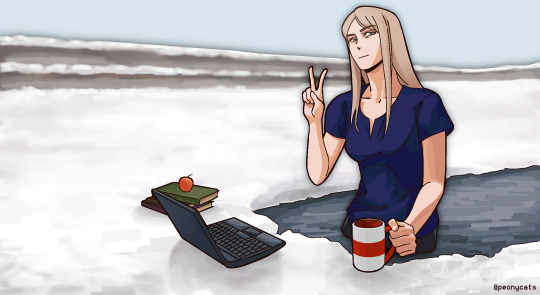

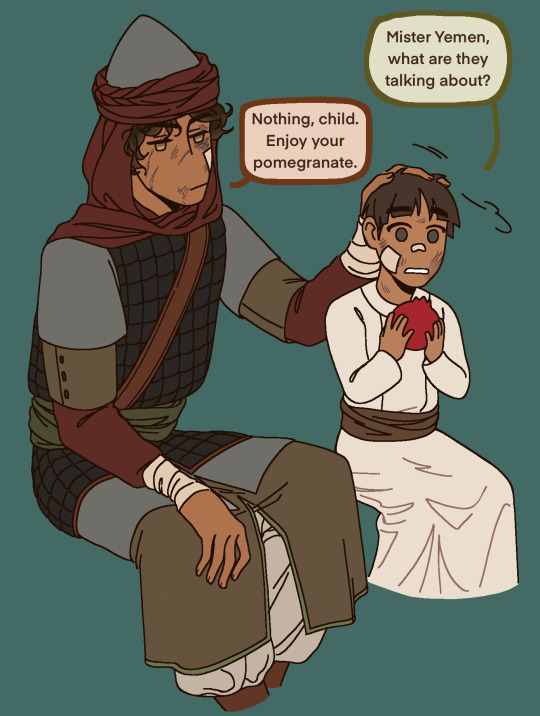
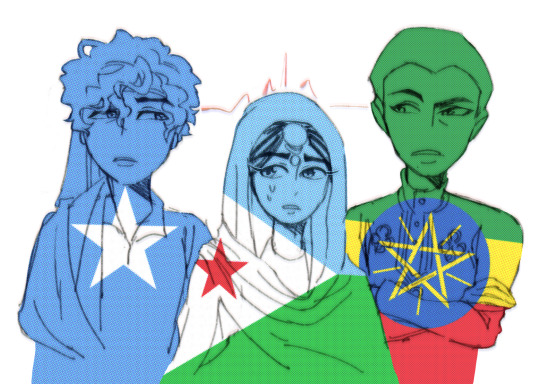
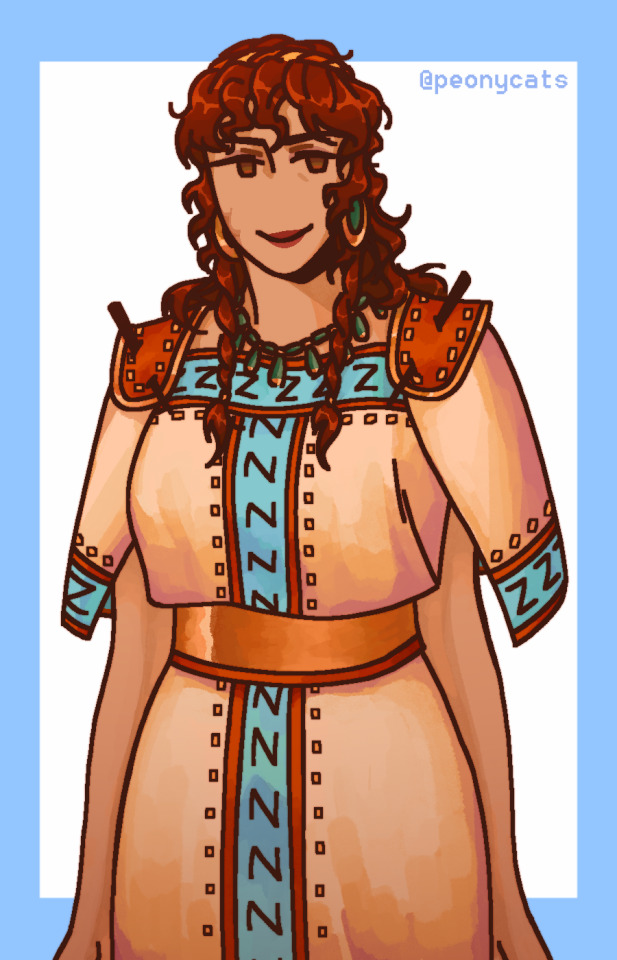

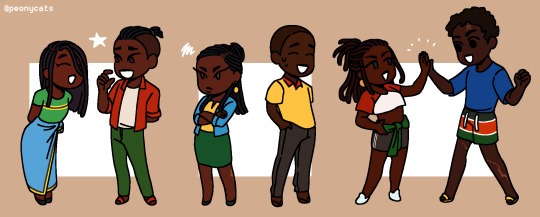
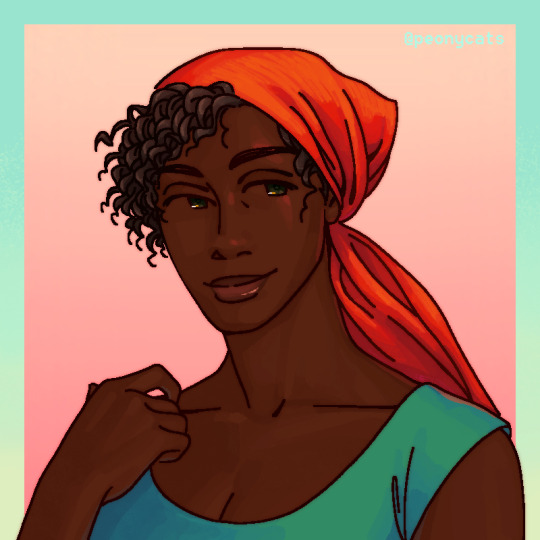
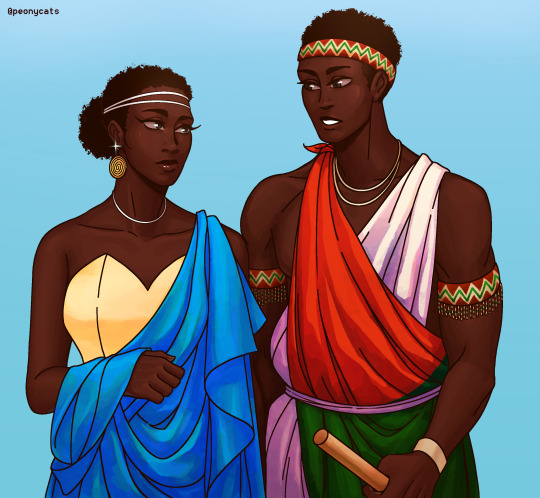

MISC ART DUMP 3
I tripped over and remembered I actually have a bunch of drawings saved up for larger posts that never came to fruition so have them while they’re within my brain attention span (alot of this shit dates back to 2021 or even 2020 so thats why its so uggo)
from top to bottom, left to right:
Belarus (chillin)
Iran, Afghanistan (Two greatly contrasting viewpoints)
Yemen, bby Oman (Oman got his ass beat by one of Saudi Arabia’s bros and Yemen got conscripted rip)
Somalia, Djibouti, Ethiopia (this is so ancient please don’t look at it)
Tarquinia/Etruria (No idea how accurate the colors are, but I do remember basing the jewelry after actual artifiacts)
Central African Republic/Centrafique (Centrafrique was meant to be a man originally, and this was one of the first drawings I did to try and redesign her!)
Tanzania, Burundi, Uganda, Rwanda, Kenya, South Sudan (Jfc south sudan is yuge)
Malawi (Still not 100% happy with her design, but I still like this!)
Rwanda, Burundi (A Rwandan tourism twitter account liked this)
India, Afghanistan (Fatality)
#hws belarus#hws iran#hws afghanistan#hws yemen#hws oman#hws somalia#hws djibouti#HWS Ethiopia#hws tarquinia#hws etruria#hws central african republic#hws bahrain#hws malawi#hws rwanda#hws burundi#hws india#hws tanzania#hws uganda#hws kenya#hws south sudan#historically inaccurate hair is historically inaccurate#hetalia#hetalia ocs#aph belarus
265 notes
·
View notes